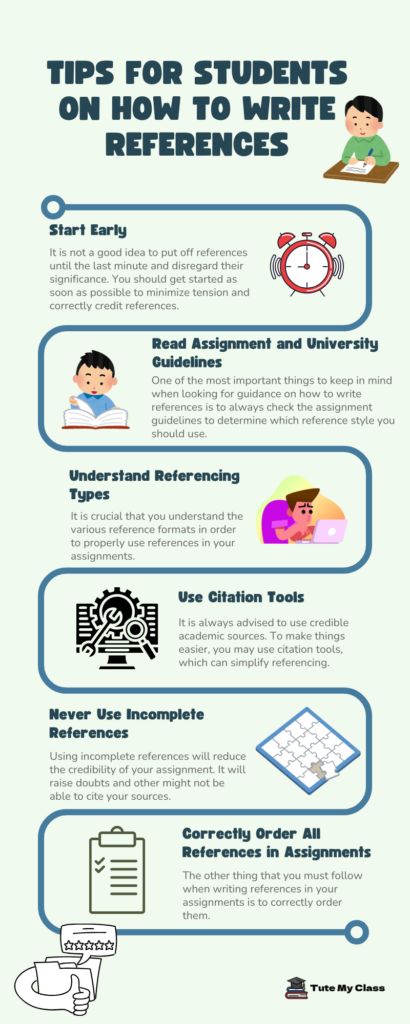
References play an important role in assignment writing. Do you know what is reference? It refers to the formal acknowledgment of the sources that you have used in your assignment. In-text citations and reference lists or bibliographies are the two forms of references. The main purpose of referencing is to provide information about the author’s name, publication date, and title. To make the assignment perfect and to score good grades, students need to cite all the sources they have used to gather information. Finishing an assignment meeting the deadline is itself a stressful task that students often miss adding references to their work. Are you also wondering if I can pay someone to take my online class to provide proper acknowledgment and avoid plagiarism issues in your assignments? Relying on professionals might not be a bad idea; however, as a student, it is essential to learn about how to write references in assignments.
This blog post will guide you on how to cite sources for an assignment. With this write-up, you can avoid plagiarism and enhance the credibility of assignments.
Different References Sources
There are many types of references that you could use in your assignment. However, you should know the meaning of each reference and use it as per your assignment need and type. Including wrong or different references can score your grades. APA (American Physiological Association), MLA (Modern Language Association), MHRA Style (Modern Humanities Research Association), chicago, and Harvard are the different reference styles that you could use in your assignments. The following are some of the sources from where you can gather information and references for your assignment.
- Books
- Journal Articles
- Websites
- Conference Papers
- Reports
- Multimedia Sources
- Legal Cases and Legislation
- Unpublished Sources
Assignment writing is the most difficult task of an academic career. To write an assignment, one needs to plan, research, draft, write, check, edit, proofread, and reference it. Do you also find assignment writing to be a long and hectic process? If yes, you may hire professionals to complete not only your university assignments but also your online classes, online exams, discussions, labs, etc. With a professional’s help, you can fulfill your dream of A grades in your assignments and online classes. The best part of expert help is that you can seek assistance for different subjects. No matter whether you are a student of nursing, accounting, history, or other, you can easily get help at an affordable price. Let’s suppose you are a nursing student who needs help with his or her online class assignments. To get help, you need to simply put in a request for, can someone take my online nursing class for me. That is it: choose a trustworthy website, hire professional writers, and relieve all your academic stress. With reliable professional online class help, you may easily improve your grades.
Why Should Students Learn About How to Write References in Assignments?
Including references in assignments is extremely essential. It will help your professors to learn about the sources from where you have collected information for your assignments. Moreover, it will also guide others to cite their assignments. As a student, it is essential for you to learn about how to add references in assignments. Here are some of the benefits of adding references in assignments:
- It helps one to acknowledge original authors’ intellectual property.
- References improve the quality of assignments and will help you score top grades.
- Collecting information from different sources is one of the important steps of the assignment. However, students often use information without giving credit, which is a serious academic offense. On the other hand, referencing assignments will prevent you from accidental plagiarism.
- It will provide thorough research and understanding of the subject.
- Reference can improve the logical flow of an assignment and will support the student’s ideas with evidence.
- It will allow other readers to consult your assignments for their reference.
- Learning how to add references in assignments will encourage independent learning.
- Referencing is one of the important guidelines of assignment writing that you must learn. It will reflect professionalism and your interest in the subject, which will result in improving academic grades.
Citing sources is important in all forms of academic writing. Whether you quote or paraphrase information, you must not forget to add references. However, do you know that you need not have to cite common information? Reference or cite only important information and list it at the end of your document.
Also Read: How to Choose the Right Online Course to Meet Your Goals
Advice for Students on How to Write References in Assignments
Do you find referencing your assignment to be a difficult task? Well, most of the students go through these issues. Understanding citation styles, keeping track of sources, and citing unusual sources are some of the challenges faced by students when writing their references. Do you also often think about how to write references? Do you also want to overcome challenges associated with referencing? Here are some of the practical tips by which you can add references in your assignments:

Start Early
To avoid any last-minute hurry, the first step is to start early. It is not a good idea to put off references until the last minute and disregard their significance. You should get started as soon as possible to minimize tension and correctly credit references. As you conduct your research, start keeping a detailed record of all the sources you have utilized.
Read Assignment and University Guidelines
One of the most important things to keep in mind when looking for guidance on how to write references is to always check the assignment guidelines to determine which reference style you should use. Most international universities have specific reference styles that you must follow. If you are unsure, ask your teacher or read the university guidelines to avoid confusion. Additionally, make sure you use the same citation style throughout your assignment, double-check your references for errors, and maintain consistency in formatting.
Understand Referencing Types and Formats
It is crucial that you understand the various reference formats in order to properly use references in your assignments. The most popular reference formats used in assignments are APA, MLA, and Harvard styles. We have included the correct format for each referencing style below so that you can better understand and use it in your assignments.
APA Reference Format:
The American Psychological Association is referred to as APA. This format adheres to a set of guidelines. Each source may have a different APA reference format. For instance, when utilizing a book, you must write the title (edition, if relevant), the year, the author, and then the publisher. You must first mention the author or authors, the year, the article’s title, the journal’s title, the volume (issue), and the page range if you are referring to a journal article. For websites, you must first include the website name, title, year, month, and day, as well as the author or organization, and URL.
MLA Reference Format:
The Modern Language Association is referred known as MLA style referencing. It is the other often used reference in essays and assignments. Common sources of reference utilized in this format include books, journal articles, websites, reports, and conference papers. For books, the correct reference style is Author(s), Book Title, Publisher, and Year. For journal articles, the correct reference format is Author(s), “Title of the Article.” The journal’s title, volume, issue, year, pages. The appropriate reference style for the report is Author(s) or Organization, Title of the Report, Publisher, Year, URL, Accessed Day Month Year, Page Range, Database Name (if online), DOI, or URL.
Harvard Reference Format:
When writing references in Harvard format, you need to follow the following format. If you want to reference your book in Harvard format, then you need to first include the author(s) (year), title of the book, edition (if not the first), place of publication, and publisher.
Never Use Incomplete References
As we all know, references in assignments enhance the credibility of the work. On the other hand, using incomplete references will reduce the credibility of your assignment. It will raise doubts and other might not be able to cite your sources. You may also be charged with academic misconduct and lose all your grades.
Correctly Order All References in Assignments
The other thing that you must follow when writing references in your assignments is to correctly order them. It has a lot of advantages, like it will ensure clarity, consistency, and professionalism.
Use Citation Tools to Correctly Follow Guidelines
If you are new and don’t know how to write references, it is possible to cite unreliable sources. However, you should not do this. It is always advised to use credible academic sources. To make things easier, you may use citation tools, which can simplify referencing. These are the best citation tools.
- Zotero
- Mendeley
- EndNote
- RefWorks
- Citation Machine
- BibTeX
- EasyBib
- Cite This For Me
- Paperpile
- Microsoft Word Citation Manager
Also Read: A Guide for Online Learning Students to Limit Digital Distractions
Frequently Asked Questions
| How to write references in APA format? This format adheres to a set of guidelines. Each source may have a different APA reference format. For instance, when utilizing a book, you must write the title (edition, if relevant), the year, the author, and then the publisher. |
| How to write professional references? Professional references are utilized in job application resumes. When writing a professional reference, act professionally, avoid using out-of-date material, avoid packing the list with too many details, and make an effort to show gratitude. |
| How to write references in research paper? In research papers, references are crucial. Prior to using references in your research paper, make sure you comprehend the goal, be familiar with the various reference formats, include in-text citations, and, if required, utilize citation tools. |
